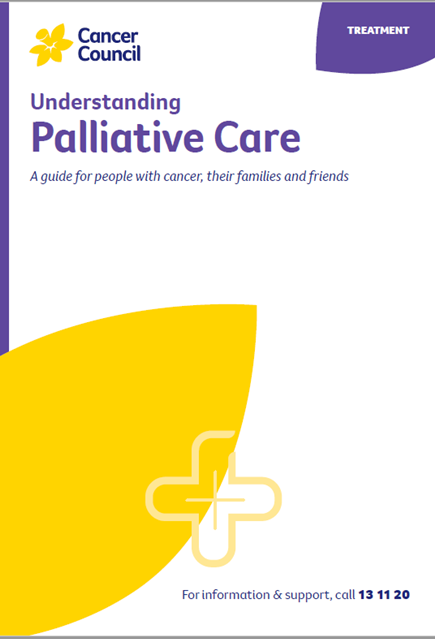- Home
- Cancer of unknown primary (CUP)
- Treatment
- Palliative treatment
Palliative treatment for CUP
Most people with cancer of unknown primary (CUP) receive palliative treatment.
Learn more about:
What is palliative treatment?
This is treatment that aims to slow the spread of cancer and relieve symptoms without trying to cure the disease. Cancer treatments such as surgery, radiation therapy, chemotherapy or other medicines are often given palliatively. It is possible that palliative treatment may make you feel better and also help you live longer.
You might think that palliative treatment is only for people at the end of their life, but it may help at any stage of advanced cancer. It is about living for as long as possible in the most satisfying way you can.
See also Using cancer treatments to control pain.
What is palliative care?
Palliative care supports the needs of people with a life-limiting illness in a holistic way. The main goal is to help you maintain your quality of life by dealing with your physical, emotional, cultural, spiritual and social needs. Palliative care also provides support to families and carers.
Specialist palliative care services don’t prescribe cancer treatments, but help people with CUP manage symptoms related to the cancer. They can also help you work out how to live in the most fulfilling way you can. You can ask your doctor for a referral.
Learn more about palliative care and living with advanced cancer.
There is still a life to be lived and pleasures to be found and disappointments to be had. Living with advanced cancer is a different life, not just a journey towards death.
Julie
→ READ MORE: Managing symptoms and side effects of CUP
Video: What is palliative care?
Watch short video on how palliative treatment aims to manage symptoms and improve people’s quality of life without trying to cure the disease.
Podcast for people affected by advanced cancer
Listen now
More resources
Prof Chris Karapetis, Network Clinical Director (Cancer Services), Southern Adelaide Local Health Network, Head, Department of Medical Oncology, and Director, Clinical Research in Medical Oncology, Flinders Medical Centre and Flinders University, SA (Clinical review); Dr Amey Aurangabadkar, Radiologist, Illawarra Radiology Group, NSW; Clare Brophy, Consumer; Prof Katherine Clark, Clinical Director of Palliative Care, NSLHD Supportive and Palliative Care Network, Northern Sydney Cancer Centre, Royal North Shore Hospital, NSW; Prof Wendy Cooper, Senior Staff Specialist, Tissue Pathology and Diagnostic Oncology, NSW Health Pathology, Royal Prince Alfred Hospital, NSW; A/Prof Richard Gallagher, Head and Neck Surgeon, Director of Cancer Services and Head and Neck Cancer Services, St Vincent’s Health Network, NSW; Dr Chloe Georgiou, Oncology Research Fellow, Australian Rare Cancer Portal, and Oncology Trials Fellow, Bendigo Health Cancer Centre, VIC; Dr Susan Harden, Radiation Oncologist, Peter MacCallum Cancer Centre, VIC; Justin Hargreaves, Medical Oncology Nurse Practitioner, Bendigo Health Cancer Centre, VIC; Dr Laura Kirsten, Principal Clinical Psychologist, Nepean Cancer Care Centre, NSW; Prof Linda Mileshkin, Medical Oncologist, Peter MacCallum Cancer Centre, VIC; Caitriona Nienaber, 13 11 20 Consultant, Cancer Council WA.
View the Cancer Council NSW editorial policy.
View all publications or call 13 11 20 for free printed copies.

